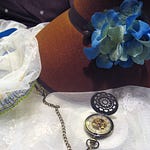A rose is a rose until you steal it, and then it becomes a catalyst.
All crimes are catalysts. Because crime begins with a series of events, that then causes another series of events. Well, that is life, isn’t it, action and reaction? So choose your actions wisely.
There is nothing like a good story to illustrate the subject. That crime touches more than the criminal and the justice system. And the story doesn’t have to be written byAgatha Christie or Raymond Chandler. Sometimes it comes to us via an ancient myth. The ancient myth of Psyche and Eros morphed into the fable, Beauty and the Beast.
Beauty and the Beast opens with a wealthy family going broke because of fraud and theft. The father, a widower, has to sell his luxurious townhouse, and move his family to a farm. His youngest daughter, named Beauty, takes action by rolling up her sleeves to be the housekeeper, and cook. The three sons become farmers. Beauty’s older sisters do nothing except complain.
The father hears that he may be able to recover some of his lost fortune. So off he goes to see what can be done. Unfortunately, he is unsuccessful. On his journey home, he becomes lost in a forest. He nearly freezes to death in a snow storm. And then, he finds himself in an enchanted estate.
The lost and hungry father is given shelter, food, clothing and treasure by an unknown benefactor. The next morning, as he walks to the stables, he sights a rose bush. He is then reminded that he promised Beauty, a rose. He wants to pick one of the roses in the garden. But no one is around to ask if its okay.
So he decides to go ahead and pick a rose.
As soon as that rose is in his hand, a dreadful voice shouts at him.
“How dare you steal my roses!”
The father turns to see a horrific looking man who is more beast than human.
“You will die for stealing that rose!”
“No, please!” the father says. “I took it for my daughter.”
“Oh yeah? Well then let’s hear what your daughter has to say. You go home, and bring her back with you in a month. But, here’s the deal; she has to come here willingly. Got it?”
The father is in a conundrum. Who would have thought that one flower could cause so much trouble?
Of course, it is not the flower, is it? It’s the theft.
Poor dad is on a roller coaster ride. He was rich, then poor, but then had his life saved, plus he was given a small fortune. But then he picks one rose, and boom, now he or his daughter face a death penalty.
It is overwhelming.
He returns home, gives Beauty, the rose. A month later, before he returns to Beast’s estate, he relates the story to his family. The two sisters, who do not like Beauty, blame her for the circumstances, because, they say, “she couldn’t be happy with a gift like a scarf or new hat. No, she had to have a rose. So good ole dad steals her a rose, and now look where we are at.”
This is a complex story, yes? That’s why I chose to include it in the book I write, titled, Leadership in Literature. All the stories in this book, which are myths and fables, are complex. They are stories that teach. Beauty and the Beast is not a romantic love story. It is a story about redemption. It’s biblical. It is profound in its theme. It’s sexy in its plot.
Leadership in Literature is about identifying the aspects of leadership most people don’t look at; beginning with personality types, the training, the call to lead, the preparation, and the hero’s journey. That is technical stuff, but I didn’t want to write a textbook. I wanted to write a story book which points out the technical stuff. Like how life can pivot on a crime, and how to handle it. I also wanted to write about women in leadership. And what I have been noticing over the years as I study more and more myths is how many women are the hero of these stories.
You will find four such stories in the book. Beauty and Beast is one of them.
Joseph Campbell, in The Hero’s Journey, talks about the calling that the hero answers before he or she takes the journey. Beauty is called. She is compelled. When her father must return to the Beast’s manor, she has to go with him. Because the inner workings of this moment are, she is finished with being the farmer’s daughter, and putting up with her two sisters. Time to get out of Dodge. That is the call to leadership. By agreeing, by willingly traveling with her dad to this Beast’s place, she has taken control of her life:Therefore, changing it.
Her journey isn’t the road trip of traveling. Her journey is to learn to love a highly flawed man, who himself is on a journey.
After a month of staying with Beast, father returns home to leave Beauty to deal with Beast on her own.
Who is Beast? To put it in the vernacular, Beast, at one time, was a complete asshole. A good witch took pity on him, and turned him, literally, inside out. Wouldn’t that be a wonderful trick, if we could see who the monsters really are?
Another point Joseph Campbell makes in his Hero’s Journey, is that many times the hero has a guide. Buddhist philosophy states that when the pupil is ready the teacher will appear. Beauty’s guide, or teacher, reveals herself to the young woman in her dreams. The guide’s message is clear: looks can be deceiving, so don’t pay attention to the outer person. Look inside. Get to know them. What are their actions?
After a while, Beauty does begin to look at her circumstances rationally. By this process, she loses her fear. She realizes that Beast will not harm her. His actions are those of a generous man. He never touches her even though the two of them are alone in that house.
By learning about one another, about their interiors, Beauty and Beast come to know one another on a very deep level. The end of the story, most of you know. That Beauty’s friendship, and her agape or universal love, have influenced Beast, and he becomes a whole man. A noble man. He is ready to be a leader.
Beauty, by losing her fear, completes herself. She will lead in her own right.
In the French version of Beauty and the Beast, the ending line is that both Beauty and Beast understand that their happiness is founded on virtue.
And so ends the story of the crime of stealing a rose. All are redeemed.












Share this post